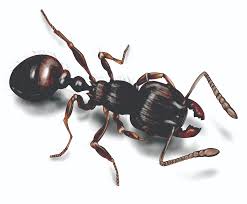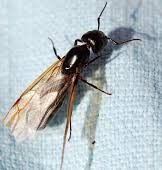Origin: Believed to originate from either  Europe or Asia, but found commonly throughout the east coast states and California, and less commonly in the Midwest.
Europe or Asia, but found commonly throughout the east coast states and California, and less commonly in the Midwest.
Biology: The common name of these ants is derived from their habit of creating nests under asphalt or concrete slabs, pushing small mounds of soil out through cracks and expansion joints. The nests are usually very shallow, and may also be found under debris or objects on the ground, as well as within structures near heat sources in the winter.
Activity is generally begun at dusk or later, and the workers forage commonly within structures, where they may feed on greases, pet foods, or sweet materials. Outdoors they feed on honeydew, fruits, or other materials.
 Swarming is most common in the spring, with large numbers emerging from numerous colonies over a period of several days. They are attracted to lights and may find their way indoors at night.
Swarming is most common in the spring, with large numbers emerging from numerous colonies over a period of several days. They are attracted to lights and may find their way indoors at night.
Identification: This is a double-node ant, shiny black, and about 3 mm long. It has a small pair of spines at the back of the thorax and it is capable of stinging, even though the workers are fairly slow moving. The workers are easily identified using magnification, to see the distinct lines on top of the head, running from front to back. Swarmers often are confused with carpenter ants, but are easily separated due to the 2 nodes, rather than a single node as is the case with carpenter ants.
Characteristics Important in Control:
The common pavement ant nest is deep underground and can be hard to eliminate. You can use non-repellent insecticide sprays around your foundation to discourage them from infiltrating your home. The best way to get rid of pavement ants is to use a slow-acting ant bait. Slow-acting ant bait allows for the foraging worker ants to eat the some of the bait but is most effective when these workers take the bait back to the rest of the colony.
When pavement ants are infesting your yard, driveway, or home, you may need to hire a professional pest control agency. A pest control technician can correctly identify the type of ant, put a plan into motion to eliminate the threat, and teach you how to prevent future issues.
Have questions about unwanted pests? Call the experts at Universal Pest Services (610)449-0740 and schedule a free inspection today!